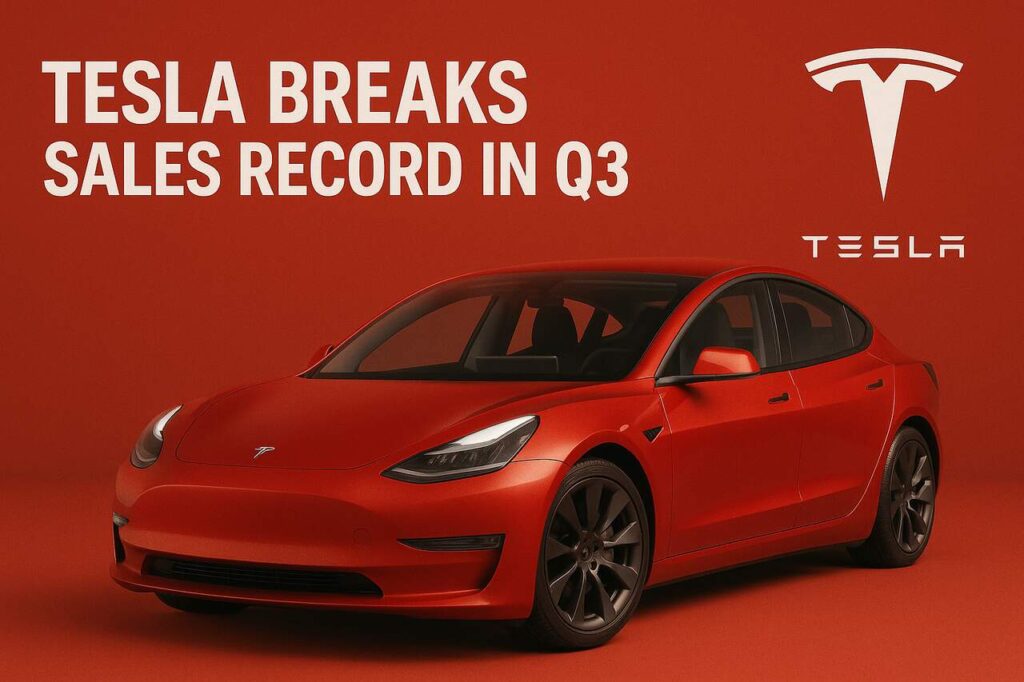Tesla achieved a record-breaking quarter as buyers rushed to secure vehicles before the expiration of a key U.S. federal tax credit. The surge not only lifted the company’s global sales but also briefly pushed CEO Elon Musk’s net worth above the historic $500 billion mark.
Tesla’s Record-Breaking Q3 Sales
Between July and September, Tesla sold 497,099 vehicles worldwide, setting a new all-time high. This figure surpassed the company’s previous record from late 2024 and represented a 29% jump from Q2 sales and a 7% increase compared to Q3 2024. Importantly, this was Tesla’s first year-over-year sales gain in 2025.
However, industry analysts caution that this momentum may not be sustainable. The U.S. EV buyer tax credit of $7,500—introduced under the Biden administration in 2022—expired on September 30 as part of President Donald Trump’s broader tax and spending package. Many buyers accelerated their purchases ahead of the deadline, meaning future demand could slow. Despite the Q3 surge, Tesla’s year-to-date sales remain 6% lower than the same period in 2024.
Stock Market Impact and Musk’s Wealth
The report initially sent Tesla’s stock (TSLA) up 2% in Thursday’s early trading, pushing shares close to their all-time high from December. This temporary rally also elevated Musk’s fortune to $500.8 billion, making him the first individual to briefly surpass the half-trillion milestone, according to Forbes’ real-time billionaire tracker. But by the afternoon, shares dipped 4%, cutting Musk’s wealth back to around $490 billion.
Competitive Pressures in the EV Market
Tesla does not disclose regional sales figures, but other automakers reported similar U.S. boosts ahead of the tax credit cutoff:
- General Motors – U.S. EV sales more than doubled in Q3.
- Ford – Achieved a 30% rise in EV sales, marking a segment record.
- Hyundai – U.S. EV sales also doubled, but the company responded to market pressures by slashing the price of its IONIQ 5 by over $9,000.
Experts predict that other automakers may adopt similar price cuts to remain competitive against both gas-powered and hybrid alternatives.
Tesla Faces Market Share Challenges
Despite its Q3 success, Tesla continues to lose global market share as competitors expand aggressively. Registration data highlights gains by Chinese automakers, particularly BYD, which saw a 31% rise in EV sales year-over-year. Even without operating in the U.S., BYD has sold 1.6 million EVs so far in 2025, outpacing Tesla’s 1.2 million vehicles globally.
This positions BYD to potentially surpass Tesla as the world’s largest EV manufacturer. Tesla’s struggles are also compounded by political backlash against Musk in both the U.S. and Europe, which has hurt brand perception in certain markets.
The Bigger Picture
Tesla’s third-quarter performance underscores both its dominance and vulnerabilities. While record sales and Musk’s fleeting half-trillion-dollar net worth make headlines, the expiration of tax incentives, rising competition from global automakers, and shifting consumer sentiment raise questions about the company’s trajectory.
For businesses, marketers, and analysts tracking digital trends, Tesla’s situation illustrates how brand perception, government policy, and competitive pricing strategies can all shape visibility—paralleling how organic search engine rankings are influenced by authority, competition, and algorithmic shifts.

